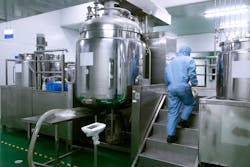How and Why Pharmaceutical Manufacturers Are Applying Artificial Intelligence
Advances in the application of artificial intelligence (AI) are starting to have a significant impact on automation technologies used across industry—most notably with machine vision and analytics. And some of the more impactful applications of AI are happening in the pharmaceutical industries.
It shouldn’t be too surprising that the pharmaceutical industries are looking to optimize production with AI, considering that single batch values for some drugs can exceed $3 million. Yet, research indicates that this industry lags many others when it comes to using analytics to improve production.
The data Leitham references comes from an AspenTech survey of 300 senior pharmaceutical executives in the U.K., U.S., Germany, France, Spain, and Sweden. This same survey also shows that 49% of respondents admit struggling to use data to improve time to market for their products.
“COVID-19 not only triggered a rush to develop a vaccine, it had serious impacts on demand for drugs already in production,” said Leitham. “The whole velocity of the market has accelerated—but our research reveals that the pharmaceutical industry has much farther to travel before it gets up to speed.”
Asset management, predictive maintenance, and analytics
Two areas of AI application focused on by pharmaceutical companies include asset performance management tools using advanced analytics to create manufacturing efficiencies and predictive maintenance systems to analyze failure patterns and provide anomaly alerts and advance warnings of pending equipment failures.
“Opportunities to reduce manufacturing costs exist across all stages of the product lifecycle. Advanced analytics can reveal those opportunities, allowing pharma companies to take informed action to save money,” said Richard Porter, global director, pharmaceuticals, at AspenTech. “Whether using multivariate analytics to identify process degradation and its impact on quality or predicting final product quality to reduce lab testing lag times, these techniques offer pharmaceutical companies a competitive advantage.”
“These tools can help identify and troubleshoot process and product quality issues, increase yields, and reduce off-spec product,” he added.
Applying AI in pharma
Highlighting specific types of equipment that predictive maintenance systems have been proven to effectively protect, Porter pointed to primary equipment such as air and centrifugal compressors, boilers, pumps, and water purification systems. AI can also be applied to secondary production and packaging equipment such as autoclaves, bead mills, centrifuges, chillers, conveyors, granulators, fluid bed and plate dryers, roller and tablet presses, and spray heads.
Porter said one pharmaceutical company AspenTech worked with was replacing the mechanical seal in its bead mill every eight batches to prevent batch loss—at an equipment cost of $25,000 per replacement.
Another pharmaceutical application Porter cited revolved around failures of a purified water system. “These failures shut down entire sections of the plant for as long as a week,” he said, “resulting in the production loss of 15 batches.”
Using Aspen Mtell to predict pending breakdowns provided the company with 35 days advance warning of a deionizer failure, allowing staff time to schedule maintenance and prevent production losses, according to Porter.
About the Author
David Greenfield, editor in chief
Editor in Chief

Leaders relevant to this article:




